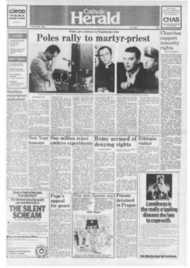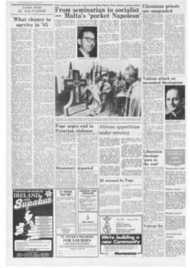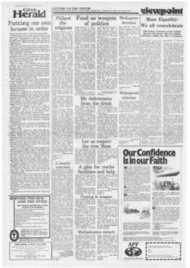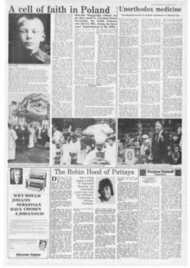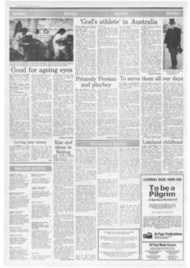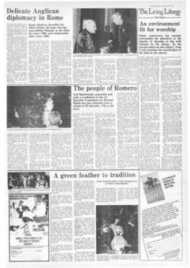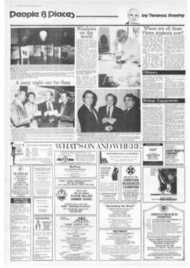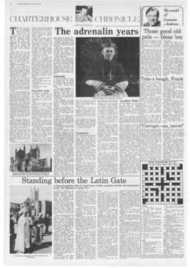Page 2, 4th January 1985
Page 2
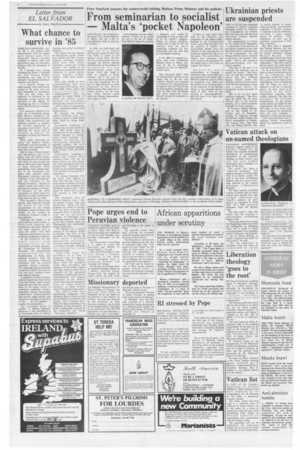
Report an error
Noticed an error on this page?If you've noticed an error in this article please click here to report it.
Tags
Share
Related articles
Pope's Message To Maltese Catholics
Malta Mob Abuses Archbishop
Maltese Hopes For Settlement Still High
Was Johnson Taken In By A Smile?
Malta's Powerful Ecclesiastic
Peter Stanford assesses the controversial retiring Maltese Prime Minister and his policies
From seminarian to socialist Malta's 'pocket Napoleon'
DOM Mintoff, who resigned on December 29 as Prime Minister of Malta, has led a life of contradictions both in and out of politics.
In 1949, the fresh-faced and eager son of a Valetta dockworker ousted Dr (later Sir) Paul Boffa as leader of the Maltese Labour Party. He then set off on a determined course to persuade the British colonial administrators of the wisdom of integrating the tiny Mediterranean island with Britain. After talks failed in 1958, he resigned as Prime Minister, and it was over 20 years later that he presided over a less than emotional (on his part at least) farewell as what remained of the British Mediterranean fleet sailed out of Valetta harbour for the final time. Often Mintoff would claim that Mairese independence only began in 1979. In his dealings with the mighty Catholic Church on an island the size of the Isle of Wight, Dom Mintoff began by entering a seminary and ended by attempting to seize at least half of all the church's property. Eldest of eleven children, rumour has it that he left his seminary after the church authorities withdrew his free scholarship after his sister had an extravagant wedding.
In the 1960s he engaged in a fierce duel with Archbishop Michael Gonzi of Malta, who went as far as forbidding Catholics to vote for Mintoff's Labour party.
They obviously didn't heed the Archbishop's call for on an island that is 98 per cent Catholic, Mintoff was returned to power in 1971. He patched up his quarrel with the Church, but the old hostilities remained, and after his fight with the British had been decisively won, Mintoff turned his attention to the Church.
A move to seize more than half of the Church's vast properties on the island failed, blocked by the Constitutional Court, and of late the fight over the question of whether the Government should force the Church to stop charging fees in its private schools has spilt on to the streets. The curial offices in Valetta were ransacked, and over a third of the population of the island took to the streets to support the Church.
Despite his many achievements in bringing a minimum wage, state health care and pensions to the island, Dom Mintoff ended his spell in office an unpopular man. Many put the decline in his fortunes down to his treatment of the British, others to the disputed election result of 1981, when he was accused of "gerrymandering" and stiff more to his fight with the Church.
blog comments powered by Disqus


